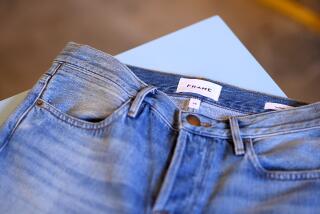Kodak Aims to Allay China’s Anti-U.S. Ire
- Share via
SHANGHAI — Supporters of the U.S. strategy of engagement with China--a policy under siege after an espionage scandal, trade discord and NATO’s inadvertent bombing of the Chinese Embassy in Yugoslavia--could make a poster child out of Eastman Kodak.
Since 1993, the U.S. photo giant has enjoyed remarkable success here. It has bumped aside foreign competitors, turned thousands of Chinese into entrepreneurs and, with the direct support of top Chinese officials including Premier Zhu Rongji, helped to privatize China’s troubled state-owned film companies.
This is supposed to be good: for Kodak, for China--and for the long-standing U.S. goal of integrating the world’s most populous nation into a global web of commercial interdependence.
But not even the government’s seal of approval could insulate Kodak from the anti-American sentiments that erupted after NATO’s May 7 bombing of the embassy in Belgrade, the Yugoslav capital. A Kodak Express store in the city of Nanjing in eastern Jiangsu province was burned, and angry protesters stopped expatriates working for Kodak and demanded to know whether they were American.
“Luckily, they knew enough to say they were Canadian or Australian,” said David Swift, the Shanghai-based chairman and president of Kodak China Co. Ltd., who also oversees Kodak’s Greater Asia region.
“I hope I never have to go through that again,” he added later. “We’ve been working through some difficult issues.”
Trade Ties Have Underlying Fragility
For U.S. firms that have devoted countless hours and billions of dollars pursuing business relationships in mainland China, the past month has been a painful reminder of the fragile psychological underpinnings of the $85-billion bilateral trade relationship.
No one is suggesting that the extensive human and economic linkages between the United States and China could unravel overnight. And while there have been reports of canceled contracts and postponed meetings, it is far too soon to measure the economic damage from the Belgrade bombing.
But the dramatic deterioration in U.S.-Chinese ties comes as even the most committed American investors are feeling the pressure of China’s slowing economy, mounting unemployment and painful economic reforms, including the restructuring of debt-plagued banks.
“There’s not a boardroom in America that isn’t taking a closer look at the long-term viability of being in the China market,” said James Zimmerman, an attorney in Beijing with the San Francisco-based Morrison & Foerster law firm.
Consumer icons like McDonald’s, Coca-Cola, Pizza Hut and Kodak may have achieved spectacular popularity in the world’s largest Communist nation, but they also are inextricably linked to a country viewed as increasingly hostile toward China’s emergence on the world stage.
McDonald’s hamburger outlets were vandalized and boycotted in the wake of the bombing. Appliances made by Whirlpool were damaged and pulled from some stores in China after angry customers complained.
“Some people had anger that had to be vented against something American,” said Franklin Starn, general manager of Whirlpool’s joint venture washing machine plant in Shanghai. “An American icon is an American icon.”
The biggest immediate beneficiaries of this turn of events are likely to be Japanese and European companies, which look good to the Chinese by comparison:
“We’re French--it’s great!” one French executive told William Fischer, executive president of CEIBS, a joint venture management school formed by the European Union and the Shanghai government.
Kodak hopes to ride out the storm. After all, it’s been a good ride until lately.
Kodak Attracted to Promising Market
It was China’s considerable allure--low camera use, rapid economic growth and a one-child policy that has created a strong appetite for “Kodak moments” among doting parents and grandparents--that prompted Kodak to launch a major comeback attempt here in 1993 after past failures.
If each Chinese household raised its per capita consumption from 0.4 rolls of film a year to one full roll, it would be comparable to adding a market the size of the United States.
Japan’s Fuji Photo Products had seized leadership in the Chinese market, relying heavily on Hong Kong middlemen to smuggle its products into the country, thus circumventing the high tariffs protecting state-owned film companies.
So Kodak launched an aggressive campaign to make itself a household name in China. It blanketed popular Chinese tourist sites with its signs, sponsored sporting events and provided X-ray processing equipment to teaching hospitals so that China’s future doctors would become Kodak X-ray film customers.
By drafting eager recruits from China’s emerging entrepreneurial class, the firm created an army of Kodak soldiers. Since 1994, Kodak has opened an astounding three Kodak Express stores a day on the mainland, bringing the total outlets to more than 5,000 nationwide. China rocketed from Kodak’s 17th largest market to No. 3.
And last year, Kodak squeezed out archrival Fuji from the No. 1 position in the Chinese film market by grabbing 35% of sales, according to the U.S. firm.
Jammy Zhuang, one of Kodak’s most successful Express operators, said the firm’s not-so-secret weapon is its reputation for quality. Kodak provides its Express stores--which are independently owned--with help in management, quality control, store design and marketing.
“I don’t think we even need to worry about competition because of Kodak’s quality control,” said the 35-year-old entrepreneur, whose chain of 14 shops is still growing.
But Kodak wasn’t content just selling film to the masses, particularly when foreign film companies still faced barriers that left them dependent on the gray market to get their products across the border from Hong Kong.
Last year, Kodak agreed to invest $1.2 billion to take over three failing state-owned film manufacturers and construct a state-of-the-art film- and paper-production plant in Xiamen, a port city in southeastern China’s Fujian province. That deal, heralded as a model for state enterprise reform, gave Kodak a starring role in a massive overhaul of China’s film manufacturing industry.
The deal was notable because Kodak was allowed to purchase the assets of the three state firms without assuming their $800 million in debts or their employees. Even more surprising, the Chinese government agreed to not allow any other foreign firm to establish manufacturing operations in China until the end of 2001.
Kodak’s success at the negotiating table--which took four years and the approval of seven Chinese companies, four provincial governments and three municipal governments--would not have been possible without the support of powerful Chinese officials, including Zhu.
But the North Atlantic Treaty Organization bombing has become a stiff test of Kodak’s ties with China and its people--and especially with its own Chinese employees.
Top Chinese government officials, including the mayor of Shanghai, immediately contacted Swift and other U.S. executives to reassure them of their continuing support. But Kodak’s chief China hand was more worried about how the incident was playing out on the streets.
In the hours immediately following the bombing, Swift was engulfed by e-mail and phone calls from frightened employees anxious for information after watching the angry protesters attack familiar American-linked landmarks.
Like other U.S. executives, Swift had to quickly devise a strategy for protecting his business while attempting to address the conflicting emotions dividing his Chinese and expatriate employees.
Close the office? Cancel trips? Apologize to Chinese employees? Or try to defend the U.S. position against the barrage of anti-American rhetoric coming from the Chinese government?
Even for a corporation practiced in the art of “not taking sides,” addressing these concerns without assigning blame was not easy. Although most Americans accept their government’s claim that the bombing was a horrifying mistake, most Chinese are convinced that it was a deliberate attack on their sovereignty and their national pride.
Swift sent an e-mail to his firm’s 2,500 employees in China expressing “great sorrow” about the tragic event, stressing the company’s long-term commitment to China and, in turn, asking for his employees’ continued support.
But even weeks later, Chinese employees admit to feeling torn between loyalty to their U.S. employer and anger at Washington.
“We understand the company’s position,” said Ren Shuna, 35, a production line operator who expresses great satisfaction at the upgraded safety standards and training opportunities offered by her new employer. “I believe the American people love peace just as much as the Chinese people. So don’t treat us unfairly; otherwise, when China becomes strong enough, the people of China will stand up for themselves.”
Kodak can hardly afford to lose the support of its Chinese workers if it is to solidify its top ranking in what is expected to become the world’s leading film market within the next decade.
Last fall, Kodak started making film products at its refurbished Xiamen plant, hiring 650 Chinese employees from those let go by the state enterprise. That plant, which imports raw film, was recently named No. 1 in quality among all Kodak plants worldwide.
Crews are working around the clock in Xiamen to complete Kodak’s new film- and paper-production facility, which will be Asia’s largest. By next year, Kodak hopes to have close to 1,000 people producing film and paper.
The mayor of Xiamen has smoothed the way for his city’s biggest taxpayer by promising to complete by this fall a multimillion-dollar bridge linking the new Haicheng factory with Kodak’s original site in Xiamen.
Time is critical because competition is getting tougher.
Fuji, far from yielding, is expanding and upgrading across China. And Lucky Film Co., China’s sole remaining state-owned film company, figures to benefit from a time of increasing nationalism.
“These days in China we have a trend of growing anti-American sentiment,” said Jia Xinfang, manager of Lucky Film’s Shanghai office. “Maybe more people will think, I don’t want to eat at McDonald’s or Kentucky Fried. Maybe we will benefit.”
More to Read
Inside the business of entertainment
The Wide Shot brings you news, analysis and insights on everything from streaming wars to production — and what it all means for the future.
You may occasionally receive promotional content from the Los Angeles Times.










